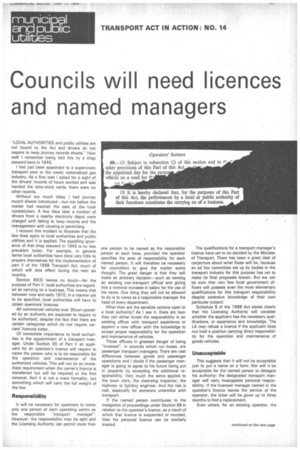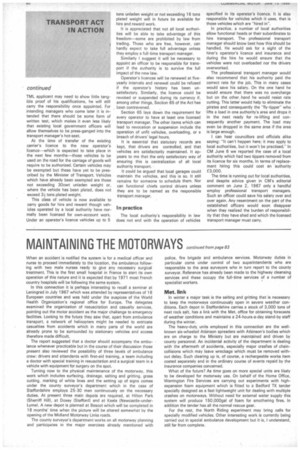Councils will need licences and named managers
Page 91

Page 92

If you've noticed an error in this article please click here to report it so we can fix it.
"LOCAL AUTHORITIES and public utilities are not bound by the Act and drivers do not require to keep journey records sheets." How well I remember being told this by a shop steward back in 1945.
I had just been appointed to a supervisory transport post in the newly nationalized gas industry. As a first task I asked for a sight of the drivers records of hours worked and was handed the time-clock cards; there were no other records.
Without too much delay I had journey record sheets introduced----but not before the matter had reached the ears of the local constabulary. A few days later a number of drivers from a nearby electricity depot were charged with failing to keep records and the management with causing or permitting.
I recount this incident to illustrate that the law does apply to local authorities and public utilities and it is applied. The appalling ignorance of that shop steward in 1945 is no less prevalent today. For example, in general terms local authorities have done very little to prepare themselves for the implementation of part V of the 1968 Transport Act, much of which will take effect during the next six months, Section 60(31 leaves no doubt—for the purpose of Part V. local authorities are regarded as carrying on a business. This means that between now and early 1970, in a manner yet to be specified, local authorities will have to obtain operators' licences, All commercial vehicles over 30cwt operated by an authority are expected to require to be authorized, despite the fact that there are certain categories which do not require carriers' licences today.
Of immediate importance to local authorities is the appointment of a transport manager. Under Section 65 of Part V an applicant for an operator's licence will require to name the person who is to be responsible for the operation and maintenance of the authorized vehicles. This will not be an immediate requirement when the carrier's licence is transferred but will be required at the first renewal. And it is not a mere formality, but something which will carry the full weight of the law.
Responsibility
It will be necessary for operators to name only one person at each operating centre as the responsible "transport manager". However, the responsibility may be split and the Licensing Authority can permit more than one person to be named as the responsible person at each base, provided the operator specifies the area of responsibility for each named person. It will therefore be necessary for councillors to give the matter some thought. The great danger is that they will make an arbitrary decision—such as naming an existing non-transport official and giving him a nominal increase in salary for the use of his name. One thing they will not be allowed to do is to name as a responsible manager the head of every department.
What then are the sensible options open to a local .authority? As I see it, there are two: they can either invest the responsibility in an existing officer with transport experience or appoint a new officer with the knowledge to accept proper responsibility for the operation and maintenance of vehicles.
Those officers in greatest danger of being "invested", in councils which run buses, are passenger transport managers. There are vast differences between goods and passenger operations and I doubt if the passenger manager is going to agree to his future being put in jeopardy by accepting the additional responsibility. Very much the same applies to the town clerk, the cleansing inspector, the highway or lighting engineer. And the risk is real, especially for someone unfamiliar with transport.
If the named person contributes to the instigation of proceedings under Section 69 in relation to the operator's licence, as a result of which that licence is suspended or revoked, then his personal licence can be similarly treated. The qualifications for a transport manager's licence have yet to be decided by the Minister of Transport. There has been a great deal of conjecture about what these will be, because an ad hoc committee set up by bodies in the transport industry for this purpose has yet to make its final proposals known. But we can be sure that very few local government officers will possess even the most elementary qualifications for this transport responsibility despite extensive knowledge of their own particular subject.
Schedule 9 of the 1968 Act states clearly that the Licensing Authority will consider whether the applicant has the necessary qualifications, or experience and knowledge. The LA may refuse a licence if the applicant does not hold a position carrying direct responsibility for the operation and maintenance of goods vehicles.
Unacceptable
This suggests that it will not be acceptable just to put a name on a form. Nor will it be acceptable for the named person to delegate his authority: the designated transport manager will carry inescapable personal responsibility. If the licensed manager named in the operator's licence leaves the service of the operator, the latter will be given up to three months to find a replacement.
Even where, for an existing operator, the When an accident is notified the system is for a medical officer and nurse to proceed immediately to the location, the ambulance following with two male nurses ready to give any necessary surgical treatment. This is the first small hospital in France to start its own operation of this nature and it is expected that by 1971 most French country hospitals will be fallowing the same system.
In this connection it is perhaps interesting to recall a seminar at Leningrad in July 1967 which was attended by representatives of 16 European countries and was held under the auspices of the World Health Organization's regional office for Europe. The delegates examined the organization of resuscitation and casualty services, pointing out the motor accident as the major challenge to emergency facilities. Looking to the future they saw that, apart from ambulance transport, a network of helicopters might be needed to extricate casualties from accidents which in many parts of the world are already prone to be surrounded by stationary vehicles and access therefore made difficult, The report suggested that a doctor should accompany the ambulance whenever practicable but in the course of their discussion those present also reviewed the possibility of three levels of ambulance crew: drivers and attendants with first-aid training, a team including a doctor with special training in resuscitation and a surgical team in a vehicle with equipment for surgery on the spot.
Turning now to the physical maintenance of the motorway, this work which includes surfacing, drainage, salting and gritting, grass cutting, marking of white lines and the setting up of signs comes under the county surveyor's department which in the case of Staffordshire employs 25-30 men continuously on the necessary duties. At present three main depots are required, at Hilton Park (Sherriff Hill), at Doxey (Stafford) and at Keels (Newcastle-underLyme). A new depot is planned at Bescot which will be completed in 18 months' time when the picture will be altered somewhat by the opening of the Midland Motorway Links roads.
The county surveyor's department works on all motorway planning and participates in the major exercises already mentioned with police, fire brigade and ambulance services. Motorway duties in particular come under control of two superintendents who are responsible to the area surveyors who in turn report to the county surveyor. Reference has already been made to the highway cleansing services and these occupy the full-time services of a number of specialist workers.
Met. link
In winter a major task is the salting and gritting that is necessary to keep the motorways continuously open in severe weather conditions. Each depot in Staffordshire carries a stock of 3,000 tons of neat rock salt, has a link with the Met, office for obtaining forecasts of weather conditions and maintains a 24-hours-a-day stand-by staff during the winter.
The heavy-duty units employed in this connection are the wellknown six-wheeled Atkinson spreaders with Atkinson's bodies which are on charge to the Ministry but are maintained and driven by county personnel. An incidental activity of the department is dealing with the aftermath of accidents, especially major crashes of chaincollisions which may leave wreckage which must be removed without delay. Such clearing up is, of course, a rechargeable works item costed separately and in the ordinary course of events repaid by the insurance companies concerned.
What of the future? As time goes on more special units are likely to be developed for motorway use. On behalf of the Home Office, Warrington Fire Services are carrying out experiments with highexpansion foam equipment which is fitted to a Bedford TK tender specially designed as a fast lightweight unit for dealing with multiple crashes on motorways. Without need for external water supply this system will produce 150,000gai of foam for smothering fires. In addition the tender has all the normal rescue gear.
For the rest, the North Riding experiment may bring calls for specially modified vehicles. Other interesting work is currently being carried out in special ambulance development but it is, I understand, still far from complete.
























































































































































